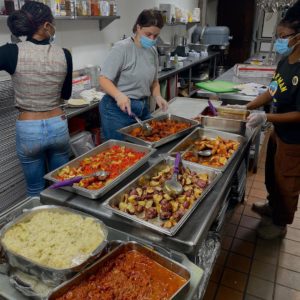Allegheny Student and Zero Hunger Intern Starts Food Recovery Network Chapter on Campus
After learning about anti-hunger movements and policy as an intern with the Congressional Hunger Center, London DeJarnette ’24 decided to bring these experiences back to Allegheny College by starting a chapter of the Food Recovery Network right here on campus.
A student-led movement, Food Recovery Network aims to fight food waste and end hunger in America by recovering leftover meals from campus dining halls.

DeJarnette says this type of program is absolutely vital on a campus like Allegheny.
“For one, it provides necessary resources for food-insecure individuals off and on Allegheny’s campus, and it addresses the environmental impact of food waste,” DeJarnette says. “Holistically, the model is sustainable, socially ethical, and improves collegiate relations with local communities.”
An environmental science and sustainability and community and justice studies double major, DeJarnette spent the summer serving as a Zero Hunger Intern at the Congressional Hunger Center in Washington, D.C. In this role, they conducted listening sessions with people experiencing food insecurity to be represented at the White House Conference on Hunger, Nutrition, and Health.
DeJarnette conducted research on Mid-Atlantic Urban Agriculture and presented their group’s findings to the Sodexo Stop Hunger Foundation. They also helped redevelop the “End Hunger in 30 Challenge” to include more recent data and broader considerations of the systemic roots of food insecurity.
The College’s previous food recovery chapter, Allegheny Food Rescue, was disbanded in 2020 due to COVID-19 restrictions. After connecting with other food justice scholars during their internship, Dejarnette decided to reapply for a new chapter at Allegheny in coordination with Aramark, the College’s dining services provider.
DeJarnette’s advisor, Assistant Professor of Environmental Science and Sustainability Jesse Swann-Quinn, says it has been rewarding to watch this project unfold.
“London has worked exceptionally hard on this project, and it’s inspiring to see it gain so much momentum so quickly,” Swann-Quinn says. “The student response has also been tremendous, and to me the project represents the best of what an Allegheny project can be: rigorous, engaged, impactful, thoughtful, creative, sustainable, and exciting.”

“So much of rural food insecurity is not a reflection of a lack of food, rather it is the result of unethically designed food systems,” DeJarnette says. “By participating in the expansive Food Recovery Network, Allegheny’s students serve to minimize the impacts of food insecurity and food waste in the Meadville community.”
During its first week of operation in early November, the chapter was able to recover 141.5 pounds of food. This number exceeded expectations, and the chapter had to acquire additional food containers to recover as much as possible. The chapter is continuing to refine the food collection, transportation, and distribution processes.
DeJarnette credits Autumn Parker ’16 from the Career Education Office with providing resources to become a Zero Hunger Intern. DeJarnette also cites Director of Civic Engagement Colin Hurley and Bonner Program Coordinator Sarah Young as key mentors for the Food Recovery Network.
Additionally, Visiting Assistant Professor of Community and Justice Studies Kat Stephens and Assistant Professor of Environmental Science and Sustainability Delia Byrnes provided DeJarnette with vital scholarly materials. With these sources, DeJarnette was able to apply theoretical frameworks for the ethics of civic engagement work to the chapter.